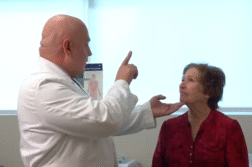MIAMI, Fla. (Ivanhoe Newswire)— There are currently more than five million Americans living with Alzheimer’s disease. Despite ongoing research, there has been no new approved drug for Alzheimer’s since 2003. Now, a new drug that is showing mixed results in trials is still giving Alzheimer’s patients a lot of hope. Details on a potential new treatment.
Seventy-six-year-old Jane Burnham loves to keep her mind sharp. She also likes to do the same for her husband Jim.
“We’ve been married for over 50 years. How many?” Jane asks Jim.
“54,” Jim replies.
“Okay,” Jane chuckles.
But you would never have known that she was diagnosed with early stage Alzheimer’s more than four years ago.
“There were instances that we kind of thought were senior moments and they were happening way too often,” Jim recalled.
Jane enrolled in a trial for the Alzheimer’s drug aducanumab. Participants were given the drug once a month as an IV infusion. It’s designed to attack amyloid protein, a biomarker of Alzheimer’s.
“Used aducanumab as a monoclonal antibody to attach to amyloid protein in the brain and remove it,” explained Mark Goldstein, MD, CPI, Principal Investigator at JEM Research Institute.
Results from one of two clinical trials showed patients who got higher doses of the drug showed 22 percent less clinical decline than the placebo group. But the other trial showed no positive results. Now there is a current ongoing trial for aducanumab to provide more data.
“There’s no placebo arm, so everybody will get the drug, and in addition, everybody is going to get the high dose of the drug,” clarified Dr. Goldstein.
Jane took part in the first trial and is now doing this ongoing trial. The mixed results haven’t changed the Burnhams’ minds about the drug.
“I think that Jane’s progression is very slow and the differences from several years ago are probably minimal and that, of course, I relate to the drug,” Jim shared.
In early November, a FDA panel voted not to endorse the Alzheimer’s drug stating there is not enough evidence to show its effectiveness. However, the drug is still up for official FDA approval by June 2021. The FDA can still approve aducanumab even if the panel does not endorse it.
Contributors to this news report include: Cyndy McGrath, Executive Producer; Milvionne Chery, Field Producer; Judy Reich, Videographer; Roque Correa, Editor.
To receive a free weekly e-mail on Medical Breakthroughs from Ivanhoe, sign up at: http://www.ivanhoe.com/ftk
Sources:
MEDICAL BREAKTHROUGHS
RESEARCH SUMMARY
TOPIC: ADUCANUMAB FOR ALZHEIMER’S: ONE DRUG, TWO RESULTS
REPORT: MB #4836
BACKGROUND: Alzheimer’s is the most common cause of dementia, a general term for memory loss and other cognitive abilities. The greatest known risk factor is increasing age, and the majority of people with Alzheimer’s are 65 and older. However, Alzheimer’s is not just a disease of old age. Approximately 200,000 Americans under the age of 65 have younger-onset Alzheimer’s. Alzheimer’s is a progressive disease where in its early stages, memory loss is mild. But with late-stage Alzheimer’s, individuals lose the ability to carry on a conversation and respond to their environment. Alzheimer’s is the sixth leading cause of death in the United States. On average, a person with Alzheimer’s lives four to eight years after diagnosis, but can live as long as 20 years.
(Source: https://www.alz.org/alzheimers-dementia/what-is-alzheimers)
DIAGNOSIS AND TREATMENT: A diagnosis of Alzheimer’s disease is based on tests your doctor administers to assess memory and thinking skills. They will perform a physical exam and assess overall neurological health by testing reflexes; muscle tone and strength; the ability to get up from a chair and walk across the room; sense of sight and hearing; coordination and balance. Lab and imaging tests can rule out other potential causes or help the doctor better characterize the disease-causing symptoms. Brain imaging pinpoints visible abnormalities related to conditions other than Alzheimer’s disease, such as strokes, trauma, or tumors that may cause cognitive change. In special circumstances, other tests may be used to measure abnormal beta-amyloid or tau in the cerebrospinal fluid. The entire set of diagnostic tools is designed to detect dementia and determine whether Alzheimer’s disease or another condition is the cause for cognitive decline.
(Source: https://www.mayoclinic.org/diseases-conditions/alzheimers-disease/diagnosis-treatment/drc-20350453)
BREAKTHROUGH ALZHEIMER’S TREATMENT: A Cambridge-based biotech company, Biogen, has results from clinical trials where participants who received the drug, aducanumab, were able to retain their memory and perform everyday tasks for longer than those who got the placebo. Before aducanumab, doctors could only offer Alzheimer’s patients drugs that would delay some of the symptoms of the disease, but nothing to slow the progression of the illness itself. Aducanumab might be able to offer patients something that no other drug candidate has been able to achieve: more time. “Having cared for hundreds of patients with this disease, this would be a game changer. At least for some of my patients, it would be something that will slow down their deterioration, that will keep them in a better place for a longer time,” said Dr. Dennis Selkoe, professor of neurologic diseases at Brigham and Women’s Hospital and Harvard Medical School, who had some patients involved in the clinical trials.
(Source: https://www.wbur.org/commonhealth/2020/08/08/biogen-alzheimers-treatment-fda-review)
FOR MORE INFORMATION ON THIS REPORT, PLEASE CONTACT:
If this story or any other Ivanhoe story has impacted your life or prompted you or someone you know to seek or change treatments, please let us know by contacting Marjorie Bekaert Thomas at mthomas@ivanhoe.com




